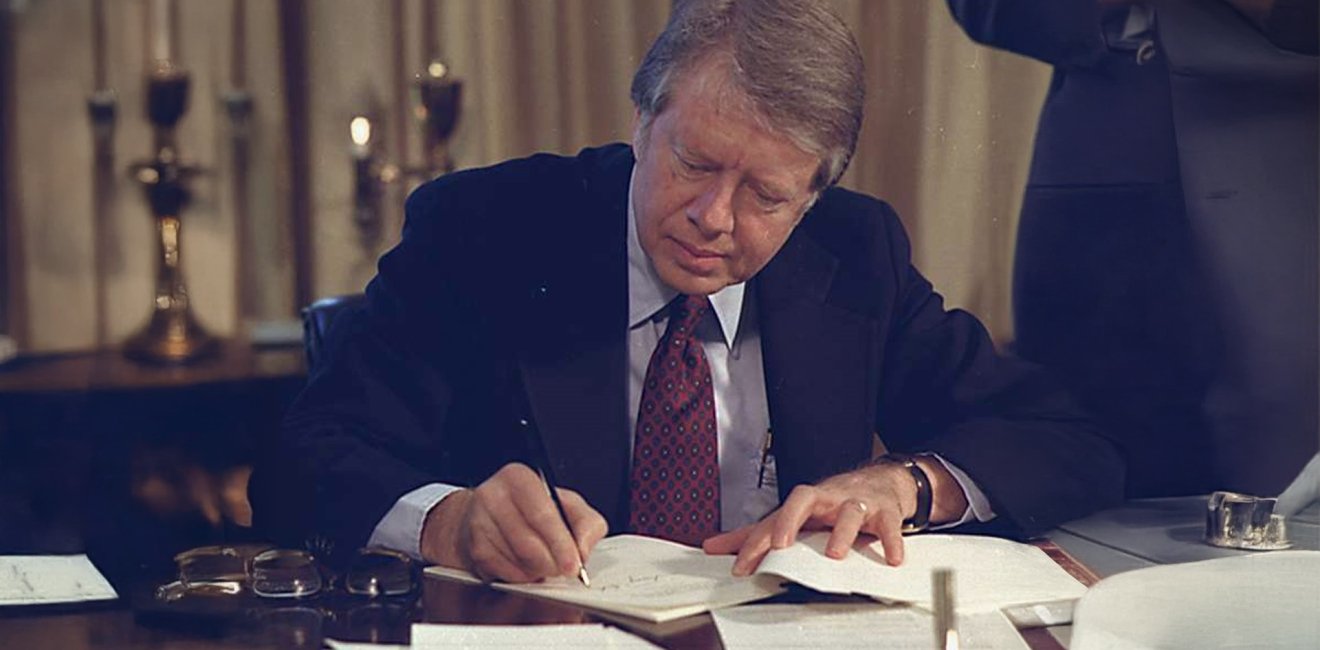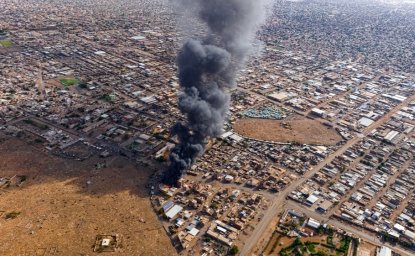Former President James Earl Carter lived and died last month with dignity, leaving a foreign policy legacy centered on human rights and refugee protection. An underestimated president, Carter gave much to the American people and even more to millions of forcibly displaced people who faced persecution and human rights abuses. I had the honor of serving in the Carter administration as research director for the US Select Commission on Immigration and Refugee Policy. I observed his leadership—and some of the problems he experienced—in formulating and implementing policies related to asylum and refugee resettlement. His successes and failures provide lessons for the future.
Historical Context
President Carter took office at a time when the lessons of the Holocaust were still painful. From the mid-1930s through World War II, it was all but impossible for refugees from Nazi Germany to enter the United States. In 1938, recognizing the desperate situation in Germany, President Franklin Roosevelt called for an international conference in Evian to discuss what should be done to help refugees. Prior to the conference, however, the US government made it clear that it would do nothing to change its own policies that made it all but impossible for refugees to enter the United States. The conference produced no additional resettlement of refugees. In a speech to the Nazi Party Congress in Nuremberg in September 1938, Adolf Hitler pointed to the hypocrisy of the countries that condemned Germany’s policies but would not admit Jewish refugees. The recognition that other countries would do little to save the Jews and other refugees paved the way for the Holocaust.
After the Second World War, the US increased its resettlement of refugees and other displaced persons but did so through ad hoc legislation and the use of parole, which enabled refugees to enter for humanitarian purposes but gave them no pathway to permanent residence unless Congress post-facto allowed a change in status. Between 1945 and 1980, both Democratic and Republican presidents exerted their authority to admit large numbers of refugees from Hungary, the Soviet Union, Cuba, Vietnam and elsewhere. Congress generally passed legislation needed to adjust their status and provide assistance to the refugees and to the states and localities that were hosting them.
Leading by Example
In 1979, record numbers of refugees exited Vietnam, Cambodia, and Laos by land and sea, on the way to Thailand, Malaysia, Indonesia, Hong Kong and the Philippines. Thailand and Malaysia, in particular, took action to prevent entry into their countries at the same time that pirates in the South China Sea began to target and often kill “boat people”, as these refugees were then called.
Recognizing a crisis in the making, the Carter administration called for an international conference to find solutions. Unlike the Evian Conference, however, the US government was serious in trying to save as many refugee lives as possible. President Carter sent Vice President Walter Mondale to Geneva to chair the conference. He had the authority to commit the United States to admit 14,000 refugees per month (168,000 per year). This led to significant pledges from Canada, Australia, France, Britain and other countries. That rate of resettlement convinced the neighboring countries to keep their borders open and allow aid organizations to operate in the refugee camps they set up.
The Refugee Act of 1980, which provides indisputable evidence of American humanitarian ideals, is an enduring legacy for which President Carter will be remembered.
Countries that did not have refugee resettlement programs, such as Japan, pledged significant resources to provide aid assistance to the refugees. Vietnam also pledged to institute an orderly departure program so that refugees would not need to risk their lives in the South China Sea. A new system for rescuing boat people at sea was also put in place. Thousands of lives were saved from this holistic approach. New problems arose, however, as exit from the source countries continued and fewer arrivals had strong claims to refugee status. Eventually, a new agreement was needed to stem the movements of those with weak claims.
The Refugee Act of 1980
While addressing the crisis in Southeast Asia, President Carter worked with members of Congress—in particular Senator Edward Kennedy—to adopt the Refugee Act of 1980. Several issues prompted the push for permanent legislation. First, the recognition that refugee crises are recurring events that affect national and international security. The ad hoc nature of US action was becoming a crisis in itself. Second, the US was likely to continue to admit those in danger because of their association with the United States, as had occurred in Southeast Asia. At the time, only those fleeing persecution from communist countries were eligible for admission. A new law was needed to redefine refugees to be in accordance with international law. Third, although there was bipartisan support for admission of refugees among members of Congress, there was also agreement that the recurrent use of parole as the vehicle for admission should be curbed.
The Refugee Act of 1980, which President Carter signed into law, addressed each of these issues. It adopted a new definition of refugees and asylum seekers that comported with and even went beyond the United Nations Convention Relating to the Status of Refugees. The legislation applied not only to those who had already fled their countries of origin but also to those still in these countries who might qualify for the type of orderly departure process used in Vietnam. The legislation gave priority for admission to refugees of ‘special humanitarian concern’ to the United States. The legislation gave the President the authority to determine how many refugees would be admitted each year after consultation with Congress, including a process for exceeding that number in case of emergencies. A significant portion of the legislation created a permanent system for providing assistance to refugees who were admitted and the role of state governments and non-profit organizations in providing that aid.
Before the implementation of the Refugee Act, a new crisis emerged with the Mariel Boatlift. Public discontent with conditions in Cuba had been brewing for years. The airlift that had allowed thousands of Cubans to come to the United States had ended. Fidel Castro had a history of opening the so-called flood gates to embarrass the US while getting rid of potential dissidents, criminals, and those with serious mental health problems. Within a few weeks, about 125,000 Cubans entered the United States, many on boats sent by relatives in Miami.
In his speech at the League of Women Voters convention, President Carter promised to “provide an open heart and open arms to refugees seeking freedom from Communist domination and from economic deprivation, brought about primarily by Fidel Castro and his government.” As the number of arrivals grew along with complaints from Florida and beyond about the newcomers, the administration took action to curb movements. The political damage could not be undone, however. Along with high inflation and other issues, immigration became a roadblock to President Carter’s re-election.
An Enduring Legacy
As the country mourns the death of President Jimmy Carter, many have spoken about his commitment to human rights. His compassion and concern for the rights of the most vulnerable only grew after his presidency. As recently as 2022, President Carter issued a statement that epitomized his views on refugees: “Our nation has long been a beacon of hope for those fleeing violence or persecution. As honorary co-chairs of Welcome.US, we urge Americans to open their hearts to these refugees and support them as they work to build new lives here among us. We stand with the people of Ukraine in their courageous fight for democracy and freedom.” The Refugee Act of 1980, which provides indisputable evidence of American humanitarian ideals, is an enduring legacy for which President Carter will be remembered.
Author

Donald G. Herzberg Professor Emerita, Georgetown University

Refugee and Forced Displacement Initiative
The Refugee and Forced Displacement Initiative (RAFDI) provides evidence-based analyses that translate research findings into practice and policy impact. Established in 2022 as a response to an ever-increasing number of people forcibly displaced from their homes by protracted conflicts and persecution, RAFDI aims to expand the space for new perspectives, constructive dialogue and sustainable solutions to inform policies that will improve the future for the displaced people. Read more





